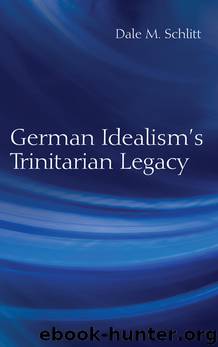German Idealism's Trinitarian Legacy by Schlitt Dale M.;

Author:Schlitt, Dale M.;
Language: eng
Format: epub
Publisher: State University of New York Press
Published: 2016-03-14T16:00:00+00:00
11
Joseph A. Bracken
A Panentheistic Process Trinitarian Society
Joseph A. Bracken, S.J., (1930– ) is “one of the more significant North American theologians of the past forty years,”1 and certainly the most important contemporary Catholic process theologian and philosopher.2 He wrote his 1968 PhD dissertation in philosophy, “Freiheit: Wesen und Wirklichkeit” (“Freedom: Essence and Actuality”) for the University of Freiburg, Germany, under the direction of his Doctor-Vater, the phenomenologist Eugen Fink. He published a revised version of his dissertation as Freiheit und Kausalität bei Schelling (Freedom and Causality in Schelling’s Thought) in 1972.3 He taught philosophy and philosophical theology at St. Mary of the Lake Seminary in Mundelein, Illinois, from 1968 to 1974. He then became a member of the Theology Department of Marquette University in Milwaukee, Wisconsin, and was named Chair of the Theology Department of Xavier University in Cincinnati, Ohio, from 1982 to 1985. He taught for the rest of his career at Xavier, where he was the first occupant of the Beckman Family Chair in Roman Catholic Theology from 1989 to 1992 and served as Director of the Brueggeman Center for Interreligious Dialogue from 1999 to 2003. He is Emeritus Professor of Theology and Director Emeritus of the Brueggeman Center. Throughout these years Bracken has continued to develop his understanding of the relationship between the one and the many in trinitarian terms. Marc A. Pugliese calls him “a shining example of the longstanding Catholic approach of grappling with the best philosophy at a given point in history.”4 Brandon Gallaher captures the essence of what Bracken has to say when, concerning Bracken, he writes that his “most important contribution to modern theology is his creative and systematic utilization, as well as thorough revision, of Whiteheadian process relational metaphysics in the service of a trinitarian vision of the God-world relationship.”5
We will be particularly interested in seeing how post-Kantian German Idealist thinkers, Schelling and Hegel in particular, have influenced Bracken as he works out a trinitarian revision of Whiteheadian metaphysics. By way of preliminary remark, we can note that he draws on Schelling whose thought he works with to reinforce Whitehead’s notion of the free, self-determining subject. He calls upon Hegel’s idea of objective spirit to strengthen the ontological status of the whole, namely, society and, consequently, to attribute a stronger notion of formal causality to Whitehead’s notion of a society. He picks up on Schelling’s insight into the nature of ground as prerational, transforming it into his enriched understanding of society as a field arising out of the interaction of concrescing subjects.
Download
This site does not store any files on its server. We only index and link to content provided by other sites. Please contact the content providers to delete copyright contents if any and email us, we'll remove relevant links or contents immediately.
The Lost Art of Listening by Michael P. Nichols(6462)
Why I Am Not A Calvinist by Dr. Peter S. Ruckman(3767)
The Rosicrucians by Christopher McIntosh(3047)
Wicca: a guide for the solitary practitioner by Scott Cunningham(2702)
Signature in the Cell: DNA and the Evidence for Intelligent Design by Stephen C. Meyer(2496)
Real Sex by Lauren F. Winner(2466)
The Holy Spirit by Billy Graham(2408)
To Light a Sacred Flame by Silver RavenWolf(2350)
The End of Faith by Sam Harris(2279)
The Gnostic Gospels by Pagels Elaine(2023)
Nine Parts of Desire by Geraldine Brooks(2002)
Waking Up by Sam Harris(1953)
Heavens on Earth by Michael Shermer(1950)
Devil, The by Almond Philip C(1896)
Jesus by Paul Johnson(1882)
The God delusion by Richard Dawkins(1843)
Kundalini by Gopi Krishna(1821)
Chosen by God by R. C. Sproul(1755)
The Nature of Consciousness by Rupert Spira(1687)
